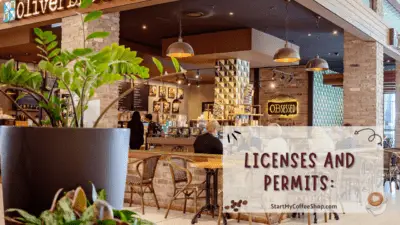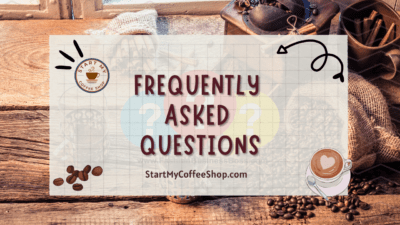Opening a coffee shop is a dream for many aspiring entrepreneurs who want to provide a cozy space for people to enjoy their daily dose of caffeine. However, like any business venture, it requires careful planning and financial considerations.
Starting a coffee shop involves several costs, including rent, renovation, equipment, licenses, staffing, marketing, and operational expenses. On average, you can expect to invest anywhere from $80,000 to $300,000 or more for a fully equipped and renovated coffee shop.
In this article, I will explore the various costs involved in starting a coffee shop.
1. Location and Rent:
Securing a suitable location for your coffee shop is the first significant expense you’ll encounter. The cost of rent can vary widely and will depend on factors such as the city, neighborhood, and size of the space you choose.
Prime locations in bustling areas, such as busy downtown districts or popular shopping centers, often come with a higher price tag due to the increased foot traffic and visibility they offer. On the other hand, less central areas or neighborhoods that are still up-and-coming might provide more affordable rental options.
When considering the cost of rent, it’s crucial to carefully evaluate how it aligns with your budget and business goals. The monthly rent you pay will directly impact your profitability, as it forms a significant portion of your operating expenses.
While a prime location may attract more customers, you need to weigh the potential benefits against the higher costs. Alternatively, a more affordable location might allow you to allocate funds towards other aspects of your business, such as marketing or enhancing the overall customer experience.
2. Renovation and Interior Design:
When budgeting for renovations, consider the various elements that contribute to the ambiance. Flooring, for example, can range from affordable options like laminate or tile to more premium choices such as hardwood or polished concrete.
Painting the walls in appealing colors that align with your brand can create a welcoming atmosphere. Adequate lighting is essential for creating the right ambiance, so invest in fixtures that provide a warm and inviting glow.
Furniture and fixtures are another aspect to consider. Comfortable seating options, such as cozy chairs and sofas, can entice customers to stay longer. Tables, countertops, and display cases should be both functional and visually appealing. Additionally, equipment like espresso machines, grinders, and brewing stations should align with your desired aesthetic while meeting operational needs.
It’s important to not only consider the initial investment for renovations but also factor in ongoing maintenance costs. Regular upkeep, such as cleaning, repairs, and replacing worn-out furniture or equipment, will ensure your coffee shop continues to provide a pleasant environment for customers.
Remember, a well-designed and functional coffee shop creates an atmosphere that encourages customers to linger, return, and recommend your establishment to others. Prioritize creating an ambiance that aligns with your brand and enhances the overall customer experience, as it plays a significant role in the progress of your coffee shop.
3. Equipment and Inventory:
Coffee shops heavily depend on specialized equipment to deliver high-quality beverages and ensure smooth operations. These essential pieces of equipment include espresso machines, grinders, brewers, refrigerators, and POS (Point of Sale) systems. Investing in quality equipment is crucial for maintaining consistency in the taste and presentation of your coffee, as well as ensuring efficiency in daily operations.
Espresso machines are the heart of any coffee shop, responsible for extracting the rich flavors from coffee beans. Grinders play a vital role in achieving the perfect grind size for espresso or other brewing methods, while brewers are necessary for preparing larger batches of coffee. Refrigerators are essential for storing perishable items like milk, cream, and other ingredients used in specialty drinks.
A reliable POS system is crucial for managing transactions, tracking inventory, and analyzing sales data. It simplifies the ordering process, enables efficient customer service, and provides valuable insights to optimize your coffee shop’s performance.
In addition to equipment costs, you must also factor in the initial inventory needed to start your coffee shop. This includes coffee beans, syrups, milk, alternative milk options, pastries, baked goods, and other consumables that will be part of your menu. The cost of inventory will vary depending on the size of your menu and the anticipated demand.
Remember that investing in quality equipment and sourcing high-quality ingredients will enhance the overall experience for your customers, leading to customer loyalty and positive word-of-mouth. Prioritize reliability, durability, and ease of maintenance when selecting equipment to ensure your coffee shop operates smoothly and consistently delivers exceptional coffee and other offerings.
4. Licenses and Permits:

Before you can open the doors of your coffee shop, it is crucial to navigate the regulatory landscape and obtain the necessary licenses and permits. The specific requirements can vary depending on your location and the scope of your operations. Common permits include health permits, food handling permits, and business registrations.
Health permits ensure that your coffee shop meets the required standards for cleanliness, hygiene, and food safety. These permits typically involve inspections by health authorities to verify that your establishment complies with regulations related to food preparation, storage, and handling.
In some cases, you may also need a liquor license if you plan to serve alcohol. This requires an additional application process, fees, and adherence to specific regulations regarding the sale and service of alcoholic beverages.
Furthermore, registering your business with the appropriate authorities is essential for legal compliance. This includes obtaining a business license, tax identification numbers, and any other permits or registrations required by local or state authorities.
To ensure a smooth opening process, it is crucial to research and understand the licensing and permitting requirements specific to your area. Contact the relevant regulatory agencies to obtain accurate information regarding the necessary permits and associated fees. By budgeting for these expenses and allowing ample time for the application process, you can ensure that your coffee shop operates legally and avoids any potential penalties or disruptions in the future.
Remember, compliance with licensing and permitting requirements demonstrates your commitment to operating a reputable and responsible business, while also safeguarding the health and safety of your customers and employees.
5. Staffing and Training:

Ensuring excellent customer service and smooth daily operations in your coffee shop hinges on building a competent and friendly team. When determining staffing requirements, consider factors such as the size of your coffee shop, peak hours, and the level of customer traffic. Hiring the right number of employees is essential to provide prompt and personalized service without overwhelming your staff or incurring unnecessary labor costs.
Apart from salaries, don’t forget to budget for employee benefits such as healthcare, paid time off, and any other perks you plan to offer. Offering competitive compensation packages can attract and retain talented individuals who are committed to delivering exceptional customer experiences.
Investing in proper training is crucial to maintain consistent quality and operational efficiency. New hires should receive comprehensive training on coffee preparation techniques, customer service protocols, and operating procedures specific to their establishment. Ongoing training opportunities can further enhance their skills, ensuring they stay up-to-date with industry trends and techniques.
In addition to the direct costs associated with staffing, such as salaries and benefits, it’s important to consider the indirect expenses. These can include payroll taxes, workers’ compensation insurance, and potential costs related to employee turnover.
Read more about Best Coffee Shop Counter Design: Designing the Ideal Counter
6. Marketing and Advertising:
Promoting your coffee shop is a vital component of attracting customers and establishing your brand identity in a competitive market. To effectively market your coffee shop, it’s important to allocate a budget for various marketing materials and initiatives.
Start by investing in well-designed and eye-catching signage that reflects your brand and captures the attention of passersby. A well-placed and visually appealing sign can entice potential customers to step inside and experience your coffee offerings. Additionally, creating professional and visually appealing menus is crucial for showcasing your menu options and pricing.
In today’s digital age, having an online presence is essential. Allocate funds to develop a user-friendly website that provides information about your coffee shop, including the menu, hours of operation, and contact details. Establishing an active presence on social media platforms, such as Facebook, Instagram, or Twitter, allows you to engage with your target audience, share updates, and promote special offers or events.
To create awareness and generate foot traffic, consider setting aside a portion of your marketing budget for advertising campaigns. This can include paid online advertisements, local newspaper or magazine ads, radio spots, or even partnering with local influencers or bloggers for sponsored content. Assess the most effective advertising channels for reaching your target market and allocate your budget accordingly.
Remember, a well-executed marketing strategy helps build brand recognition, drives customer traffic, and establishes a loyal customer base. By investing in marketing materials, online presence, and strategic advertising campaigns, you can effectively promote your coffee shop and position it for long-term growth in a competitive market.
7. Utilities and Operational Expenses:
Running a coffee shop entails a range of ongoing expenses that must be carefully accounted for to ensure smooth operations and financial stability. These expenses include utility bills such as electricity, water, and internet services. Understanding the average monthly costs for these utilities is important for budgeting purposes and to avoid any unexpected spikes in expenses.
In addition to utilities, there are other operational costs to consider. Insurance coverage is crucial to protect your coffee shop from unforeseen events such as accidents, property damage, or liability claims. The cost of insurance premiums will depend on various factors such as the size of your establishment and the coverage options you choose.
Maintenance costs should also be factored into your budget. Regular upkeep of equipment, fixtures, and the physical space itself is necessary to ensure smooth functioning and a pleasant environment for both customers and staff. This may include routine equipment servicing, repairs, and general maintenance tasks.
Other expenses to consider include cleaning services to maintain cleanliness and hygiene standards, as well as waste disposal fees for proper management of trash and recyclables.
8. Contingency Fund and Working Capital:
When embarking on the journey of starting a coffee shop, it’s important to anticipate unforeseen expenses and potential fluctuations in revenue. Building a contingency fund is a wise financial strategy to account for unexpected costs that may arise along the way. This fund serves as a safety net, providing the necessary financial cushion to handle unexpected repairs, equipment breakdowns, or other unforeseen circumstances that may impact your business.
Furthermore, it’s crucial to ensure you have sufficient working capital to manage daily expenses until your coffee shop becomes stable. In the early stages, there may be a time before your coffee shop starts generating a consistent stream of revenue. Having enough working capital allows you to cover essential expenses such as rent, utilities, inventory, and employee salaries during this initial phase.
Maintaining a healthy cash flow is vital for the sustainability of your coffee shop. It ensures that you can meet your financial obligations and continue to operate smoothly, even during slower business periods. By planning and budgeting carefully, you can determine the optimal amount of contingency funds and working capital needed to weather any uncertainties that may arise in the early stages of your coffee shop’s operation.
Summary
Opening a coffee shop is an exciting endeavor, but it requires careful financial planning and consideration of various expenses. From location and rent to equipment, inventory, staffing, marketing, and operational costs, there are many factors to account for when estimating the startup cost.
Remember, investing in quality and customer experience can make all the difference in attracting loyal patrons and turning your coffee shop into a thriving business.
Frequently Asked Questions

Question: What are the ongoing operational expenses for a coffee shop?
Ongoing operational expenses for a coffee shop include rent, utilities (electricity, water, internet), staffing costs (salaries, benefits), inventory replenishment, marketing and advertising expenses, maintenance costs, and insurance premiums.
Question: Are there any hidden costs associated with starting a coffee shop?
These may include unexpected repairs, regulatory compliance costs, permit fees, and additional marketing or promotional expenses.
Question: What are the primary factors that affect the progress of a coffee shop?
Location plays a crucial role. Additionally, factors like quality products, exceptional customer service, effective marketing, competitive pricing, and creating a welcoming atmosphere all contribute to a coffee shop’s long-term growth.
To learn more on how to start your own coffee shop checkout my startup documents here
Please note: This blog post is for educational purposes only and does not constitute legal advice. Please consult a legal expert to address your specific needs.

Hi! I’m Shawn Chun
My adventure in coffee began when I first launched my first coffee shop back in the early 2000s. I had to figure out so many things on my own and to make it worse within 2 years of opening two large corporate coffee chains moved in just blocks away from me!
As I saw smaller and even some larger coffee shops in the neighborhood slowly lose customers to these giant coffee chains and slowly close up shop, I knew that I had to start getting creative…or go out of business.
I (like you may be) knew the coffee industry well. I could make the best latte art around and the foam on my caps was the fluffiest you have ever seen. I even had the best state-of-the-art 2 group digital Nuova Simonelli machine money could buy. But I knew that these things alone would not be enough to lure customers away from the name brand established coffee shops.
Eventually, through lots of trial and error as well as perseverance and creativity I did find a way to not only survive but also thrive in the coffee/espresso industry even while those corporate coffee chains stayed put. During those years I learned to adapt and always faced new challenges. It was not always easy, however, in the end, I was the sole survivor independent coffee shop within a 10-mile radius of my location. Just two corporate coffee chains and I were left after that year. All told the corporate coffee chains took down over 15 small independent coffee shops and kiosks and I was the last one standing and thriving.
Along the years I meet others with the same passion for coffee and I quickly learned that it is not only “how good a barista is” that makes a coffee shop successful, but the business side of coffee as well.
Hence why I started this website you are on now. To provide the tools and resources for up and coming coffee shop owners to gain that vital insight and knowledge on how to start a coffee shop successfully.
Stick around, browse through my helpful blog and resources and enjoy your stay! With lots of LATTE LOVE!
Shawn







